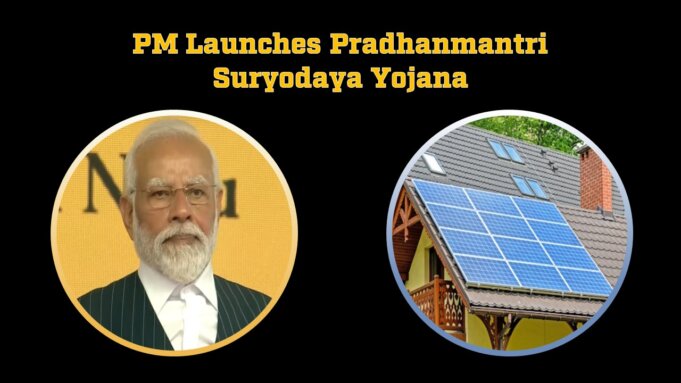On 22 January 2024, PM, Narendra Modi launched “Pradhanmantri Suryodaya Yojana” with the target of installing rooftop solar on 1 crore houses. Immediately after his visit to Ayodhya on the auspicious occasion of consecration of Lord Shri Ram, the Prime Minister chaired a meeting to launch “Pradhanmantri Suryodaya Yojana” with the target of installing rooftop solar on 1 crore houses at his residence at Lok Kalyan Marg, New Delhi.
The Scheme aims to reduce the electricity bill of the poor and middle class, along with making India self-reliant in the energy sector. The Prime Minister also directed to start a massive national campaign to mobilize residential segment consumers to adopt rooftop solar in large numbers. He said that the power of the Sun can be harnessed by every household with a roof to reduce their electricity bills and to make them truly Aatmanirbhar for their electricity needs.
Pradhanmantri Suryodaya Yojana aims to provide electricity to low and middle-income individuals through solar rooftop installations, along with offering additional income for surplus electricity generation.
Rooftop solar systems in India represent a significant and growing sector of the renewable energy market. The Indian government, through its Ministry of New and Renewable Energy (MNRE), has been actively promoting rooftop solar installations. Various initiatives, such as the Jawaharlal Nehru National Solar Mission and more recent policies, aim to achieve a substantial amount of solar power capacity, with a significant portion coming from rooftop installations. Incentives include subsidies, tax benefits, and favorable net metering policies.
India has a vast potential for rooftop solar systems due to its geographical location. The country receives abundant sunlight for most of the year, making solar power a viable option. The rooftop solar market has been growing steadily, driven by decreasing costs of solar panels, increasing cost of grid electricity, and growing environmental awareness.
Net metering is a key policy that allows consumers to feed surplus solar energy back into the grid. This not only helps in reducing the electricity bill but also contributes to the overall energy production. Many states in India have implemented net metering policies to encourage rooftop solar installations.
Advances in solar panel technology, including higher efficiency panels and innovations in storage systems, are making rooftop solar more attractive. Additionally, integrated solutions that combine solar installations with smart energy management systems are gaining popularity.
In summary, rooftop solar systems in India are an integral part of the country’s shift towards renewable energy. Supported by government initiatives and driven by economic and environmental factors, this sector is poised for significant growth despite facing certain challenges.











